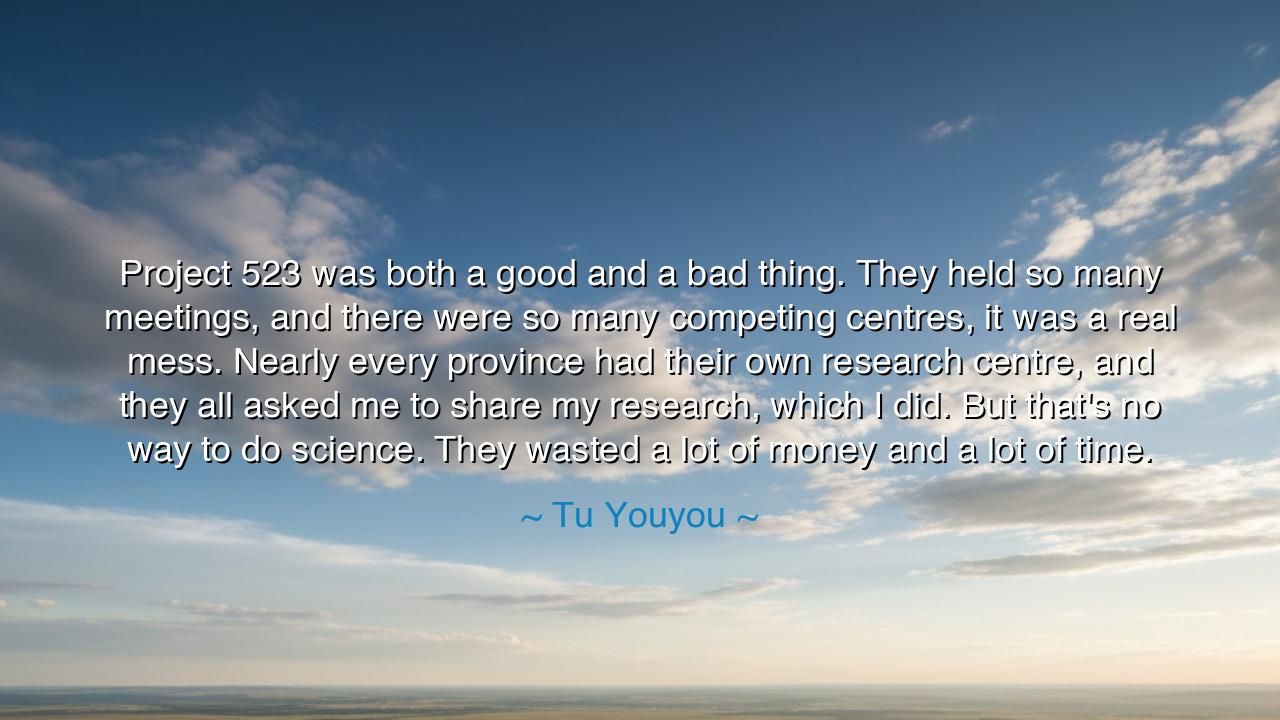
Project 523 was both a good and a bad thing. They held so many
Project 523 was both a good and a bad thing. They held so many meetings, and there were so many competing centres, it was a real mess. Nearly every province had their own research centre, and they all asked me to share my research, which I did. But that's no way to do science. They wasted a lot of money and a lot of time.






In the grand tapestry of science, where knowledge is pursued with vigor and the promise of progress is always just beyond the horizon, there are times when the path becomes obscured by disorder and mismanagement. Tu Youyou, a name forever etched in the annals of medical history for her groundbreaking work in discovering artemisinin, the life-saving treatment for malaria, speaks with great clarity on the frustrations of Project 523: "Project 523 was both a good and a bad thing. They held so many meetings, and there were so many competing centres, it was a real mess. Nearly every province had their own research centre, and they all asked me to share my research, which I did. But that's no way to do science. They wasted a lot of money and a lot of time." In this reflection, Tu reveals a powerful truth about the nature of collaboration and the organization required to turn great ideas into great achievements.
When Tu Youyou speaks of the competing centres and the disorganization of Project 523, she is not just describing a single project; she is describing the perennial challenge faced by those who seek to achieve greatness through collective effort. The ancient philosophers and scientists often spoke of the need for focus and clarity in the pursuit of knowledge. Aristotle, with his systematic approach to understanding the natural world, warned that progress in any field requires order, structure, and a clear sense of purpose. Just as the chaotic assembly of many competing forces in Project 523 led to wasted time and resources, so too did the fragmented, disjointed efforts of the ancient world hinder the advancement of knowledge until the right minds, with the right organization, came together to propel humanity forward.
Consider, O children of the future, the tale of Isaac Newton, whose monumental work in calculus and gravity could not have been achieved in a chaotic or disorganized manner. Newton was a man who valued focus above all else. He famously said, “If I have seen further, it is by standing on the shoulders of giants.” This statement reflects the importance of building upon the work of others, but also the need for coherent collaboration. Newton did not flounder in the disarray of competing ideas; he embraced the clear structure that allowed him to see farther. His clarity of purpose and concentration in his research led to discoveries that changed the world. In contrast, the experience of Tu Youyou in Project 523 is a cautionary tale of what happens when efforts are scattered and unfocused—when too many competing voices dilute the potential for true progress.
Tu’s frustration also highlights the importance of sharing knowledge, but in the right manner. The willingness to collaborate is a trait that all great minds share, from Galileo to Marie Curie. Yet, collaboration must be purposeful, organized, and driven by a clear vision. Tu shared her research as she was asked, but she recognized that a system without direction is more of a hindrance than a help. The ancients often spoke of the value of unity—the idea that collective wisdom is most powerful when it is guided by clear leadership. The scattered, aimless efforts of Project 523 wasted not just resources, but the very potential that could have been harnessed to eradicate malaria more quickly.
The lesson that Tu Youyou’s words impart to us is profound: organization is as crucial to scientific progress as the research itself. There is no true advancement without structure, focus, and collaboration built on a foundation of shared vision and mutual respect. To do science, as Tu points out, is not simply to exchange ideas haphazardly, but to organize these ideas, to test them rigorously, and to move with a sense of purpose toward a common goal. This is the way of the true scholar—the one who understands that while collaboration is essential, it must be purposeful and well-coordinated.
O children of the future, when you seek to uncover the mysteries of the world, do not be swayed by the chaos of many voices. Instead, seek clarity in your work and your collaborations. Let your efforts be guided by a shared vision, a focused mission, and a plan that honors the time and resources of all involved. You, too, may face the obstacles that Tu Youyou encountered—where your work may be scattered across competing interests, and your potential may feel diluted by the distractions of disorganization. But heed the wisdom of history and of Tu herself: true greatness comes not from the volume of voices, but from the clarity of purpose and the unity of effort.
Thus, in every endeavor you pursue—whether it be in science, art, or the challenges of life—remember that the path to progress is not always easy or direct. Like the great thinkers before you, you must learn to organize, focus, and collaborate with a sense of clarity and intention. The mistakes of the past are the lessons of the present, and the wisdom gleaned from the chaos of Project 523 is one that can guide you toward a future where knowledge and effort are channeled into lasting and transformative achievements. Let your work be not just a scattering of thoughts and ideas, but a purposeful, unified force that shapes the world.






AAdministratorAdministrator
Welcome, honored guests. Please leave a comment, we will respond soon